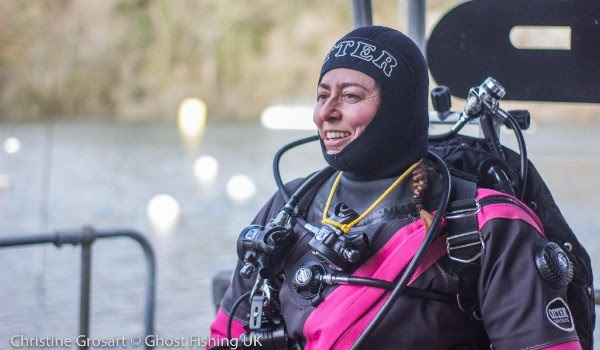
Toni Norton prepares to dive. Image: Christine Grosart
Although a relatively experienced diver and instructor, I feel it is important to continue my education, and so it was great to have the opportunity to join the beta (second pilot) class for the up-coming Ghost Fishing UK training course.
I’ve been aware of Ghost Fishing UK for some time as a close friend is heavily involved and I was lucky to attend a talk up in Orkney last year while the team were cleaning up the world famous wrecks in Scapa Flow. My first real interaction with Ghost Fishing UK was in January when I joined a weekend in Portland, to gain an overview of what it is all about. There I learned how much more there is to surveying and removing lost and abandoned fishing gear than I expected! I was really pleased to be invited onto the beta training course!
The course was written by Christine Grosart, who is not only the Ghost Fishing UK secretary but also a very capable and competent diver (she holds the UK Women’s British Cave Diving record), and delivered by Christine, Richard Walker (Ghost Fishing UK chairman and Board of Advisors member for Global Underwater Explorers), Fred Nunn (Ghost Fishing UK treasurer and BSAC instructor) and Colin Stratton (active Ghost Fishing UK team member and multi-agency technical diving instructor). The other participants were all seasoned twinset divers, so the overall level of competence on this beta course was high.
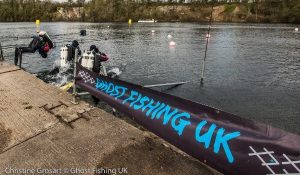 | 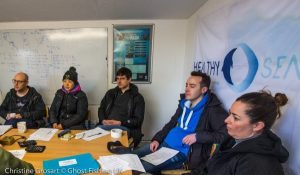 |
Forward roll entry. Image: Christine Grosart | Theory lessons. Image: Christine Grosart |
The course is modular, allowing participants to attend the modules when they can, and Ghost Fishing UK make good use of technology to offer the theory by skype sessions, which is particularly efficient when running a course with participants based across the UK.
There are six modules:
- Introduction to Ghost Fishing UK;
- Basic skills;
- Survey;
- Ghost fishing and the law;
- Ghost gear recovery; and
- Public outreach and recycling.
All modules have a theory portion and modules 2, 3 and 4 have in-water sessions.
Following a course introduction (including meeting the trainers, an overview of the course and the Ghost Fishing UK standard operating procedures), we continued into module 1 to give us a more detailed understanding of ghost fishing, history of the Ghost Fishing UK charity, the charity’s mission and how the reporting system works.
This gave us a more rounded understanding of the issues faced and how we, as team members, would be helping to face the huge issue of lost and abandoned fishing gear. We then had a theory session on basic skills, which are key for every diver but much more important when dealing with high-hazard activities such as recovering ghost gear.
The hazards were explained and we discussed the importance of team diving, planning, buoyancy, control, propulsion techniques and streamlining equipment. This was followed up by a thorough in-water session practicing the above-mentioned skills along with other key skills, such as gas analysis and cylinder marking (land skill), out of gas drills and deploying SMBs.
 |  |
Rich Walker. Image: Christine Grosart | Colin Stratton talks about ghost gear recovery. |
We then moved on to learning about survey work with a classroom session on survey planning, surveying techniques, the important details to capture on a survey (and why), marine life identification and release, before heading back into the water to conduct a survey (following a detailed planning session).
The Ghost Fishing UK training team had prepared and placed a fantastic training environment at Vobster Quay, allowing us to survey a number of different types of gear including lobster pots, ropes, lines and nets. We soon learned that detailed surveying is a key skill and some people are fantastic at drawing while others are better suited to holding lights to support the person drawing (me!). Using the flexibility in the course (and the wish to trial the effectiveness of the webinar solution for modules that were theory based) we then moved straight on to module 5, the recovery.
We had a thorough theory session to learn about decisions to be made for retrieval, using separate cylinders to fill lift bags (we don’t use our breathing gas as we may need that!), cutting techniques, planning, safety techniques and team working.
Following a thorough planning session, we then conducted a land drill session to practice everything we would do in the water (from team positioning to using the cutting devices and carrying stage cylinders), we then got in the water to lift the training gear that we had surveyed on a previous dive. Under Fred’s careful supervision, our team set out to cut and remove sections of rope, stowing them in bags, and then lift a lobster pot.
Once in the water, the planning and land drills paid off as we worked well as a team and there was never any confusion about our roles or how we were going to achieve our objective. It was extremely satisfying seeing the plan come together and as the lobster pot made it’s (very slow and controlled) way to the surface, we were all pleased with our team effort!

Instructor Fred Nunn prepares to dive. Image: Christine Grosart
Following a debrief on site, we headed off (scattering across the UK from Cornwall to Hertfordshire), looking forward to completing the course via a webinar just a few days later. The webinar covered the introduction and module 1 as new trainees were there too and then covered module 4: Ghost Fishing and the Law, giving us an introduction to licencing (and the licences currently held by Ghost Fishing UK), the Marine and Coastal Access Act 2009 and the Ghost Fishing UK method statement.
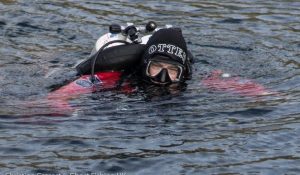 |  |
Image: Christine Grosart | Image: Christine Grosart |
 |  |
Scubadog Mika. Image: Christine Grosart | Neil Bosher. Image: Christine Grosart |
We then moved on to module 6: Public Outreach and Recycling, giving us an insight into Ghost Fishing UK partners, the media, materials available to us, fundraising and the issues surrounding recycling and disposal. All in all, this was one of the most interesting and rewarding courses that I have done.
As a team member I now have visibility of some of the exciting projects that are coming up, as well as the fantastic work the team are doing. Personally, I am hugely looking forward to being involved in a few surveys and lifts over the next few weeks as well as running a stand and delivering a talk at SharkFest in Bristol (12th May 2018). I’ve also supported on a couple of talks and we’re gaining more interest in London (where I’m based), with a club already offering use of their boat to support the Ghost Fishing UK team. I can’t wait to get more involved with this fab group conducting this challenging and phenomenal work!
 | 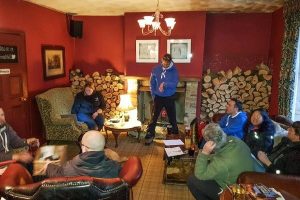 |
Image: Christine Grosart |


I am keen to attend your training package. I am North Yorkshire based padi rescue attached to BSAC 43 at redcar.
I’ve dived a twinset for abot 3 years. I am interested in diving with a purpose and to make a differance
Excellent! We haven’t got next year’s training programme scheduled yet, but the best way to get notified is to sign up to the email newsletter and/or like us on Facebook. We’re running taster sessions at NDAC in February (8th-9th), which is a great opportunity to come and meet us, booking details will be emailed out in January.
Brilliant I will look at getting down there and keep an eye out for booking processe if any,
If there is a mailing list can you add me [email protected].
I am freshly back on FB after a brake so will hunt the event down that way
Hi Chris, Booking for the 2020 Winter Warmer is open now here https://www.store.ghostfishing.co.uk/
Pingback: From BSAC Sports Diver to Ghost Fishing UK Diver - GhostFishing UK